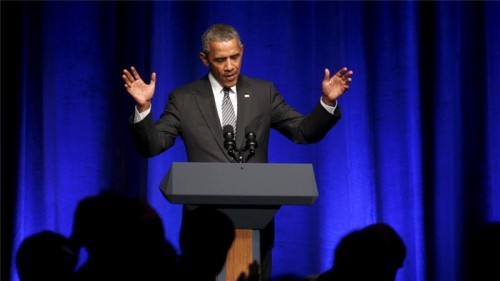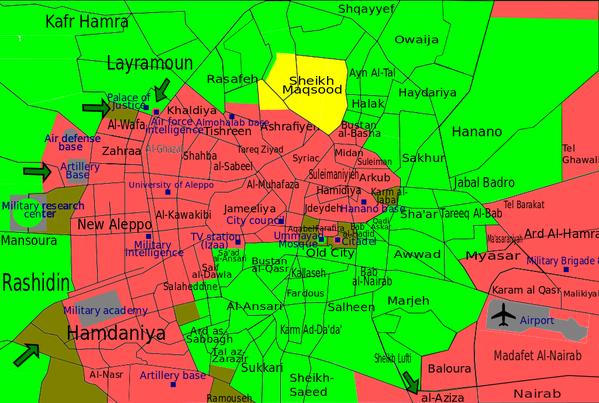PHOTO: President Obama speaks at the UN Global Development Summit on Sunday
LATEST
- Rebel Spokesman: Ceasefire Continues in Zabadani and in Northwest Despite Weekend Clashes
- Kurds Advance in Aleppo City in Clashes with Rebels
MONDAY FEATURES
Video: Obama Speech at UN “We Will Join Discussions with Russia and Iran”
Special: Getting It Wrong on Assad and a “Political Solution”
Video: Russia’s Putin Speaks on US Television
US President Barack Obama will meet Russian leader Vladimir Putin at the UN on Monday, amid Moscow’s escalating military intervention in Syria and its political initiative to prop up the Assad regime in the short-term.
Obama and Putin will each deliver addresses to the UN General Assembly in the morning before their evening discussion. The US President will also co-chair a session on UN peacekeeping operations.
On Sunday, Secretary of State John Kerry saw Russian Foreign Minister Sergei Lavrov and said:
[Our approach] is not yet coordinated.
Our presidents will be meeting tomorrow. This is the beginning of a genuine effort to see if there is a way to deconflict [preventing clashes amid Russia’s stepped-up military operations], but also to find a way forward that will be effective in keeping a united, secular Syria that can be at peace and stable again without foreign troops present, and that’s our hope.
Kerry initially objected when Russia’s input of warplanes, advanced military equipment, and troops was revealed in early September. However, the US tone soon moved to accommodation, as Moscow maintained that the build-up is against the Islamic State. The US military has expressed “concern” over any Russian operations against Syrian rebels, rather than the Islamic State or the Islamist faction Jabhat al-Nusra, which the US-led aerial coalition has also bombed.
“A senior US official” noted last week that Russian drones have conducted about half a dozen reconnaissance missions over areas in western Syria where there are only rebel forces and no Islamic State fighters.
On Sunday, Russia scored another PR victory when the Iraqi military confirmed that Baghdad has joined Moscow, Iran, and Syria in a center for “collecting information about ISIS [Islamic State] terrorism”.
A US military spokesman in Baghdad said, “We do not support the presence of Syrian government officials who are part of a regime that has brutalized its own citizens.”
Meanwhile, the US and European powers such as Germany and Britain have shifted toward Russia’s initiative of an international conference to keep President Assad in power during a transition. Kerry said last week that Assad does not have to depart on “Day 1 or Month 1” of the process.
On Sunday, the Washington Post reported, from Administration sources, that Washington is putting a review of strategy against the Islamic State on hold because it needs more information about Russia’s intentions in Syria.
See Syria Feature: US Officials — We’re Putting Strategy on Hold Because of Russia’s Intervention
Beyond Syria, Putin blamed supposed Western efforts to expand NATO for Russia’s conflict with Ukraine, claiming a “military coup organized from outside triggered a civil war”.
Rebel Spokesman: Ceasefire Continues in Zabadani and in Northwest Despite Weekend Clashes
A spokesman for Ahrar al-Sham, the largest rebel faction, has confirmed that a ceasefire continues in both rebel-held Zabadani near Damascus and in two regime enclaves in Idlib Province despite weekend bombing and clashes.
The ceasefire, reached last week between Ahrar al-Sham for the rebels and Iranian negotiators for the Assad regime, halts both the three-month Hezbollah-regime offensive on Zabadani and the rebel attacks on al-Fu’ah and Kafraya, north of Idlib city. The pause in fighting allows for evacuation of fighters from Zabadani, 31 km (19 miles) northwest of Damascus, and for women, children, and men over 50 from the two enclaves.
Over the weekend, Syrian warplanes bombed Taftanaz, northeast of Idlib city, in apparent violation of an agreement not to attack areas in Idlib Province. Rebels retaliated with shelling of al-Fu’ah and Kafraya, where there were also clashes with regime forces.
See Syria Developing: Rebels — Ceasefire Collapsing After Regime Attacks in Northwest
Kurds Advance in Aleppo City in Clashes with Rebels
The pro-opposition site el=Dorar al-Shamia reports that rebels have pulled out of the Shiekh Maqsoud area of Aleppo city after fighting with the Kurdish militia YPG.
The site said Sham Front fighters pulled back to a defense line in the al-Castelo district, the only area into which supplies can be delivered.
The fighting escalated last week in and near the city. Rebels and activists accuse the YPG of attacks on vehicles bringing food and essential items through eastern Aleppo Province. They also said on Sunday that YPG sniper fire had killed one man and injured three other people.
See Rebels Accuse Kurdish Militia of Attacks on Vehicles Supplying Eastern Aleppo Province
El-Dorar claims that the YPG will work with the Assad regime in establishing a crossing, controlled by the regime and manned by YPG fighters.
Local journalist Abu Hamza confirmed that the Kurdish-rebel conflict began over the key point: “The Kurds wanted to open up a crossing with the regime in the neighborhood to benefit from trade…which the rebels refused.”
Ahrar al-Sham and Jabhat al-Nusra have said that they will take armed action to defeat the Kurdish militia, but the Sham Front has pulled back from joining operations.
Ahrar Asham and Nusra are willing to storm Sheik Maqsoud and drive YPG out . Other rebel groups will not participate.
— Abdurahman Harkoush (@Abduhark) September 28, 2015
The Aleppo Local Council has issued a statement holding the Syrian Kurdish political movement PYD “responsible for all events” and criticizing the party’s “willingness to exit an organization that has been created freely by all Aleppo liberated areas…to create a self-independent organization”. It also claimed the Kurds were blocking benefits to Sheikh Maqsoud’s residents from local services and refusing the entry of humanitarian aid, as well as opening the crossing with the regime-controlled area.
In March 2013, rebels and YPG cooperated in expelling regime forces from Sheikh Maqsoud.


